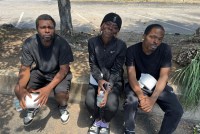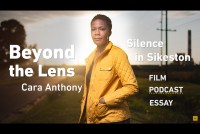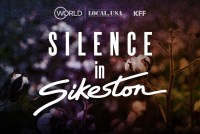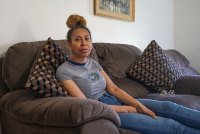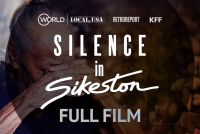Latest KFF Health News Stories
California Continues Progressive Policies, With Restraint, in Divisive Election Year
This legislative cycle, Gov. Gavin Newsom signed bills affirming reproductive rights and mandating insurance coverage of in vitro fertilization, but the Democrat was reluctant to impose new regulations and frequently cited costs for vetoing bills.
Mountain Town Confronts an Unexpected Public Health Catastrophe
Flooding wrought by Hurricane Helene devastated communities around Asheville, North Carolina. A host of government programs are helping restore water, food, and medicine.
Super Bowl Rally Shooting Victims Pick Up Pieces, but Gun Violence Haunts Their Lives
Eight months after the Feb. 14 shooting, people wounded at the Kansas City Chiefs parade are wary of more gun violence. In this installment of “The Injured,” survivors of the shooting say they feel gun violence is inescapable and are desperately seeking a sense of safety.
Extended-Stay Hotels, a Growing Option for Poor Families, Can Lead to Health Problems for Kids
Extended-stay hotels are often a last resort for low-income families trying to avoid homelessness. But hotel living can lead to — or exacerbate — various physical and mental health issues for children, say advocates for families and researchers who study homelessness.
Watch: ‘Breaking the Silence Is a Step’ — Beyond the Lens of ‘Silence in Sikeston’
KFF Health News Midwest correspondent Cara Anthony discusses her reporting for the “Silence in Sikeston” multimedia project, which explores the impact of a 1942 lynching and a 2020 police killing on a rural Missouri community — and what it led her to learn about her own family’s past.
Asian Health Center Tries Unconventional Approach to Counseling
Facing a dire shortage of bilingual and culturally attuned therapists, an Oakland, California, community clinic serving Asian immigrants has trained staffers in a victim support unit to provide lay counseling.
Silence in Sikeston: Is There a Cure for Racism?
In the finale of “Silence in Sikeston,” Black residents organize a Juneteenth barbecue. The Department of Public Safety chief encourages officers to attend to build trust. But improving relations between Sikeston’s Black community and the police won’t be easy. Host Cara Anthony discusses the possibility of institutional change in Sikeston.
Harris’ Emphasis on Maternal Health Care Is Paying Dividends With Black Women Voters
Polls are showing renewed support from Black women voters for the Democratic ticket. Vice President Kamala Harris has backed key health priorities for Black women.
Silence in Sikeston: Trauma Lives in the Body
Denzel Taylor, a young Black father, moved from Chicago to Sikeston, Missouri, for a fresh start in life. There, he proposed to his girlfriend, started a family, and then, in April 2020, was fatally shot by police officers. Taylor had two young daughters and another on the way when he was killed. Pediatrician Rhea Boyd talks about how children process such loss.
California Voters Consider Tough Love for Repeat Drug Offenders
A California ballot measure would roll back some decade-old criminal justice reforms that have become fodder for Donald Trump’s presidential campaign. Stiffer penalties for shoplifting have gotten much of the attention, but the measure also allows controversial treatment requirements for repeat drug offenders.
Nursing Aides Plagued by PTSD After ‘Nightmare’ Covid Conditions, With Little Help
A KFF Health News investigation reveals that employers and the government have offered nursing aides little assistance for PTSD and other ongoing maladies triggered by hazardous work during the pandemic.
Fighting Staff Shortages With Scholarships, California Bill Aims To Boost Mental Health Courts
A new bill would create a scholarship program for students who agree to work with specialized courts in California to get patients into treatment, but some people argue the state shouldn’t restrict scholarship aid to a new, untested program given broader behavioral health workforce shortages.
Watch: New Documentary Film Explores a Lynching and a Police Killing 78 Years Apart
The “Silence in Sikeston” documentary film explores how the nation’s first federally investigated lynching and a police killing 78 years apart haunt the same rural Missouri community. The film from KFF Health News and Retro Report explores the lasting impact of such trauma — and what it means to speak out about it.
Silence in Sikeston: Hush, Fix Your Face
In Episode 2 of the “Silence in Sikeston” podcast, host Cara Anthony speaks with Sikeston, Missouri, resident Larry McClellon, who grew up being told not to talk about the 1942 lynching of Cleo Wright. He is determined to break the cycle of silence in his community. Anthony also unearths a secret in her own family and grapples with the possible effects of intergenerational trauma.
A Possible Downside to Limits on Teens’ Access to Social Media
In 1982, then-Surgeon General C. Everett Koop warned that video games might be hazardous to young people’s health, a statement he later walked back, acknowledging it had no basis in science. These days, state and federal policymakers are sounding alarms about the need to protect children from the harmful effects of social media platforms such […]
Décadas de programas nacionales contra el suicidio no han frenado estas muertes
Durante los últimos 20 años, funcionarios federales han lanzado tres estrategias nacionales de prevención del suicidio, incluida una anunciada en abril.
Decades of National Suicide Prevention Policies Haven’t Slowed the Deaths
Despite years of national strategies to address the suicide crisis in the U.S., rates continue to rise. A chorus of researchers and experts say the interventions will work — but that they’re simply not being adopted by state and local governments.
Tossed Medicine, Delayed Housing: How Homeless Sweeps Are Thwarting Medicaid’s Goals
As California cities crack down on homeless encampments in the wake of a U.S. Supreme Court ruling authorizing fines and arrests, front-line workers say such sweeps are undercutting billions in state and federal Medicaid spending meant to stabilize people’s health and get them off the streets.
No One Wants To Talk About Racial Trauma. Why My Family Broke Our Silence.
Every family has secrets. I spent the past few years reporting about racial violence in Sikeston, Missouri. Interviewing Black families there helped me uncover my family’s traumatic past, too.
‘What Happens Three Months From Now?’ Mental Health After Georgia High School Shooting
The recent shooting at Apalachee High School outside of Atlanta caused more than physical wounds. Medical experts worry a lack of mental health resources in the community — and in Georgia as a whole — means few options for those trying to cope with trauma from the shooting.




